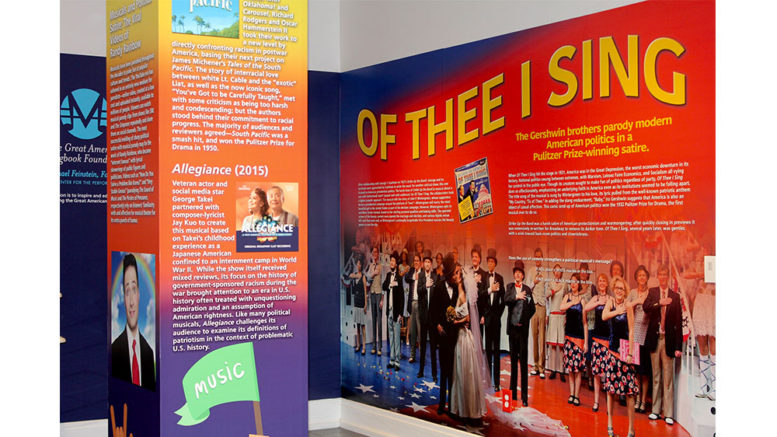With a momentous national election just a year away, the Great American Songbook Foundation has assembled an interactive historical exhibit exploring the intersection of politics, patriotism and entertainment in the world of musical theater – and it didn’t start with Hamilton.
Of Thee I Sing: Politics on Stage is on display through November 2020 in the Foundation’s Songbook Exhibit Gallery, housed at the Palladium concert hall at Carmel’s Center for the Performing Arts. Admission is free to the gallery, which is open 10 a.m. to 4 p.m. Mondays, Thursdays and Fridays; 10 a.m. to 2 p.m. Tuesdays and Wednesdays; noon to 4 p.m. the second Saturday of each month (starting in January); and one hour prior to select Palladium performances.
Broadway shows highlighted in the exhibit include:
- Of Thee I Sing (1931) – a groundbreaking, Pulitzer-winning blend of romantic comedy and political satire with songs by George and Ira Gershwin
- Camelot (1960) – a retelling of the King Arthur legend that took on political significance when the widowed Jacqueline Kennedy made it a metaphor for her husband’s short-lived presidential administration
- 1776 (1969) – an unlikely hit among liberals and conservatives alike during a contentious period in U.S. history
- 1600 Pennsylvania Avenue (1976) – a heavy-handed flop by composer Leonard Bernstein and librettist Alan Jay Lerner that closed within a week of opening
- Hamilton: An American Musical (2015) – Lin-Manuel Miranda’s hip-hop-influenced take on the Founding Fathers, which claimed 11 Tony Awards while tackling contemporary political and social issues.
The exhibit also examines the treatment of war, race, women’s rights and other issues in musicals such as Hair, South Pacific and Cabaret; the work of musical satirists like YouTube star Randy Rainbow; and the well-known Broadway and Tin Pan Alley composers who wrote campaign jingles and patriotic songs over the years.
For example, in a project presaging the civic-minded Schoolhouse Rock animations of the 1970s, lyricist Hy Zaret (“Unchained Melody”) authored a political songbook for kids in the 1950s titled Little Songs for Busy Voters.
In addition to images and artifacts from the Songbook Foundation’s vast archives and other sources, the exhibit includes various interactive elements. A large touchscreen allows visitors to browse through related songs and images from the featured musicals. At several points, the exhibit invites viewers to ponder thought-provoking questions and respond “yes” or “no” by dropping a white or black marble into a clear container. The voting will be tracked throughout the year on the Foundation’s social media accounts.
“With all the partisanship in the news these days, we wanted to create an environment where visitors of all ages could consider politics from a fresh angle and enjoy some constructive conversation about these important social issues and how they are portrayed in our popular culture,” said professional exhibit developer Cathy Hamaker, one of several experts who assisted Songbook Foundation Archivist Lisa Lobdell in designing Of Thee I Sing.
A traveling version of the exhibit is available free of charge for display by schools, libraries and other community organizations.

